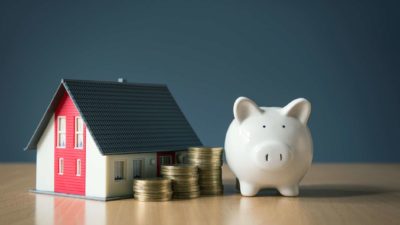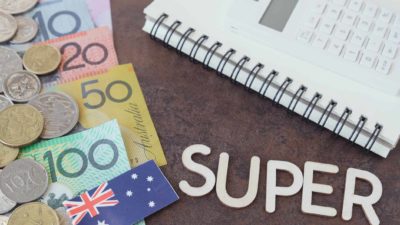As I write this, my wife is in the dining room at home, helping our 7 year old son through his first day of learning from home.
Earlier, I'd been to the supermarket. It must have been my lucky day, because there was toilet paper on the shelves for the first time in a week and a half. I'd bought some a couple of weeks ago on special, so we weren't in dire straits yet… but I wasn't sure how long it'd be until regular supply was restored, so I grabbed a pack.
This is, of course, our new normal. At least for now.
Thankfully, so far, we don't have any family or friends infected with Coronavirus. And we're not the exceptions. There are still a remarkably small percentage of the population diagnosed as having the virus. And even more thankfully, a very low fatality rate.
Which I'm thankful for. But I'm thinking of those who haven't been so lucky.
If there's one thing investors come to learn — hopefully sooner rather than later — it's the power of exponential numbers.
Kids can grasp the series: 1, 2, 3, 4, 5… n
But even adults struggle to grasp exponentiality. Oh, we all think we get it, but if we really did, more of us would spend less, save more, and avoid expensive consumer debt.
In case you're new to the idea, here's one example of exponentiality:
20
400
2,036
5,883
15,113
31,506
59,138
If you're wondering, that's the series that represents reported case numbers of Coronavirus in Italy every 5 days since February 21.
From Feb 21 to Feb 26, they added 380 cases. But the next 5 days wasn't just another 380, then another 380 after that.
It was — say it with me — exponential.
It's what investors call compounding. Just not, in this case, in a good way.
The second term I want to briefly mention is 'counterfactual'.
In normal-person-speak, it means 'what would have happened, had a particular intervention not occured'.
We'll never know — with certainty — what would have happened if Italy had moved more swiftly. Or if Singapore had moved more slowly.
We can guess, and we can infer, but we'll never know for sure.
More challenging is looking at many different inputs. If you're a government, and you have to consider economic as well as health outcomes, the decisions get harder. Then, add in the impacts on health itself of higher unemployment and increased homelessness, for example. Plus, as we've heard — a lot — this past week, there's the question of school closures: yes, we might slow the spread of infection, but at what cost to the health workforce in a country that already has a relatively small (compared to some countries) number of high dependency hospital facilities?
What if the second- and third-order economic impacts (on health and wellbeing) swamp the first-order impacts we're trying to avoid?
By now, some of you are in fierce agreement with the point you think I'm making. Others of you are ready to throw things.
But do you really know the point I'm making? Or have you decided you know, and you're responding accordingly?
Unlike most Australians on social media these days, I'm not a health expert. I don't know what health authorities should recommend, nor what governments should do. Yes, I've thought about what I might do, were I a Prime Minister or Premier, but I'm 100% sure I don't have access to all of the information and advice they're receiving.
I'm not drawing — nor advancing — a conclusion from the paragraphs above, save for one: good decision-making needs to consider all of the information, including the second- and third-order effects, as well as the counterfactual, before reaching a conclusion.
Which, to bring it back to investing for a minute, describes perfectly what investors should do, too.
Now, I have a confession to make: I underestimated the impact of Coronavirus, on health and finances, for the first month or so of its known existence.
Drawing on past experience with SARS, MERS, and other would-be crises (Grexit, Brexit, a Trump presidency, etc), I figured the odds were in favour of this one being managed or contained with little economic impact.
I was wrong.
Now, I have to say, I'm yet to work out if I was wrong for the right reasons, or just old-fashioned wrong.
Does it matter?
In one sense, no. The money I've lost is still gone.
But in another, yes. It matters deeply.
Which is where the counterfactual comes into play.
See, if I'd jumped at every shadow — and there have been plenty over my time as an investor — I'd have spent the last two decades in cash.
There is never, ever a time when there's no doom-and-gloom headline, and nothing to worry about.
I've written — many, many times — about investing being a case of riding the waves, rather than avoiding the ocean.
And I've written — many, many times — that "being optimistic and occasionally wrong is far more profitable than being pessimistic and occasionally right."
I stand by both of those sentiments, on average and over time.
Still, once the dust settles, I'll go back to the circumstances of this instance and review my actions and decisions.
Did I miss signs that this wasn't just going to be another run of SARS or MERS — at least early enough to have made better decisions?
(And for those of you who say 'Derr, of course it was going to be worse', I'd suggest you look at your own decision-making similarly. If you'd predicted Trump was going to be bad for the stock market, or that China was going to implode in 2011, 2013 2015…. Then you're making the same potential errors, just in reverse.)
I'll give credit here to my erstwhile colleague Joe Magyer and our Director of Research, Anirban Mahanti, who each recognised the outsized impact of Coronavirus right, before I did.
I thought the odds of this level of economic disruption were very small. I'm not even sure I was wrong, at the time, given what we knew (though I may have been). I wonder in what proportion of the 1,000 parallel universes, this crisis was contained early, and there are currently no global restrictions on movement, for example?
See, that's the hard thing about investing.
When we put our money down, we're taking risk. There is no risk-free investment, unfortunately — just higher or lower levels of risk.
The job of the investor — professional and amateur alike — is to make sure we're being offered the right amount of return, for the given amount of risk.
The other thing to remember is that sometimes those risks actually eventuate.
Which shouldn't be a surprise, but for many people it is.
"Didn't you know X could happen?"
Yes.
"Then why did you invest?"
Because the odds were low, and, even if the event comes to pass in one situation, it likely won't in another.
A once-in-a-hundred-year storm won't only happen in the 100th year.
The odds of tossing 10 heads in a row are incredibly small. Which doesn't mean it won't happen — it just means it'll be exceedingly rare.
As Warren Buffett's mate Charlie Munger once described it:
"We look for a horse with one chance in two of winning and which pays you three to one."
How do we manage that investment risk?
By having a sufficiently large (measured by number of companies) portfolio, with a range of uncorrelated risks.
Not so that none of them come to pass, but that, when some of them do, we still earn a positive return, overall, for the total portfolio.
The same is true of dollar-cost-averaging (making small, regular investments, at regular intervals). It lowers the risk at any particular time by spreading the investments over a long period (preferably our entire working life) each fortnight, month or quarter.
But back to my confessions.
The first, as you'll recall, is underestimating this particular virus (which will either be a sin of commission, or the correctly assessed odds, but this time the result wasn't in my favour).
The next one is acting on that view. I bought shares a couple of weeks ago.
That one hurt.
It's possible that, because I underestimated Coronavirus, some of those purchases — particularly travel companies — will go badly.
Time will tell.
Why did I buy? Because I thought the odds were on my side. I thought, given the suddenly lower share prices, the risk was worth taking for the potential return on offer.
I didn't just buy travel companies, of course. I deployed cash across 6 or 7 investments (from memory).
I fully expect them, as a group, to make me money.
I expect they'll beat the market, over the long term.
Am I certain? No. Certainty is the enemy of the investor. If you're certain about anything, you're blind to, or underestimating, the risks.
But why buy at all? Why not just sell everything? Then there's no chance of losing money.
Which is true.
But it also removes the chance of making money.
See, what people remember most about the GFC is the painful, grinding fall.
What they forget — because our evolutionarily-constrained minds lead us that way — is that there was a slow, but meaningful rise from the ashes.
No, I didn't pick the bottom of the GFC. But I bought shares.
I don't remember with clarity the daily movements, but there's a very, very good chance those shares lost money for a while: the 'why not just sit on cash?' period.
The answer is in their subsequent recovery.
I bought and held shares because I expected the economy, and the stock market, to recover.
I bought and held shares because I knew from experience and education, that the short term emotional pain was worth the long-term financial gain.
I bought and held shares because I knew that 'this too shall pass'.
I have no idea how much further shares may — or may not — fall from here.
I have no idea how long the economic and financial pain lasts.
There is no shortage of 'experts' out there, telling you what's going to happen in the short term.
Do you really think they know? Or are they presenting opinion as fact?
How could they know? We've never been here before.
And if they don't know, why would you act on their advice?
For the record, I have the same instinctive evolutionary response to the doom-and-gloomers as you do: 'But what if they're right? I mean, it's possible.'
Is it likely, though?
You could be hit by the proverbial bus. It's possible.
You could be struck by lightning. It's possible.
Can you see why our brains are drawn to those spouting doom? It was an evolutionary advantage, when the choice was between 'run' or 'wait and see if it's a lion'.
You can't diversify your life and death decisions.
We're not on the savannah any more, though.
We don't have to guess which short-term prognosticator might be right.
Over the long term, things come into clearer focus.
For example:
— The ASX has always gone on to hit new highs.
— Dollar-cost-averaging has always worked — financially and emotionally.
— Diversification is the only free lunch in investing.
Those are long term approaches.
Yes, maybe it's different this time. I can't rule it out.
All I can do is look at more than a century of market data — through wars, panics, a depression and a GFC — as a guide.
The health news will get worse. The economic news will get worse. We will have a recession. Some small and large businesses will fail.
Here's the thing, though — I fully expect that those that survive will likely go on to thrive, as a group.
So if those same businesses are selling for cheap prices, today, and you have both a diversified portfolio and the stomach to ride out the storm… Doesn't it seem likely that current prices might be a buying opportunity (or, at least, that quality shares are worth holding rather than selling)?
I'm still investing. Not because it's guaranteed, but because history suggests that, done well, it's a wonderful way to build wealth, despite the volatility.
Fool on!








